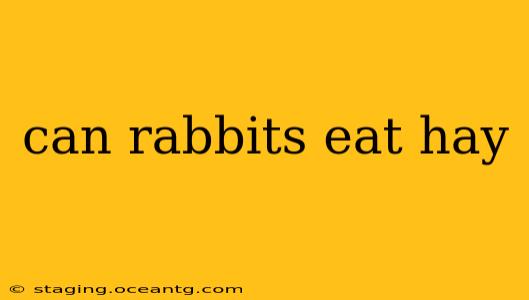Hay is the cornerstone of a healthy rabbit diet. The simple answer is: yes, rabbits absolutely need to eat hay. In fact, hay should make up the bulk of their diet, comprising around 80-90% of their daily food intake. This isn't just a suggestion; it's crucial for their digestive health and overall well-being. Without sufficient hay, rabbits are at a significantly increased risk of developing serious health problems.
Let's delve deeper into why hay is so important and address some common questions surrounding rabbit hay consumption.
What Kind of Hay Can Rabbits Eat?
Rabbits can eat a variety of hays, but not all are created equal. The best options are:
- Timothy hay: This is generally considered the best choice for adult rabbits. It's low in calcium and high in fiber, which is vital for preventing dental problems and promoting healthy digestion.
- Orchard grass: Another excellent choice for adults, orchard grass is slightly higher in protein than timothy hay, making it a good option for growing rabbits or those needing a bit more energy.
- Meadow hay: A mix of different grasses, meadow hay offers variety and can be a good option, but be mindful of the specific grasses included as some may be higher in calcium.
- Alfalfa hay: While sometimes used for young, growing rabbits or pregnant/lactating does (female rabbits), alfalfa is higher in calcium and protein. Adult rabbits should only consume alfalfa hay in moderation to avoid health issues like urinary tract stones.
Avoid: Hays containing clover or other legumes should be limited due to their higher calcium content. Moldy or dusty hay should never be given to rabbits, as it can lead to respiratory problems and other health issues.
How Much Hay Should a Rabbit Eat?
The amount of hay a rabbit needs depends on its size, age, and activity level. However, a good rule of thumb is to provide a constant supply of fresh hay, ensuring that the hay rack is always full. A rabbit should have free access to hay at all times, day and night. This allows them to graze naturally, which is essential for their digestive system.
What Happens if a Rabbit Doesn't Eat Enough Hay?
Insufficient hay intake can lead to a range of serious health problems in rabbits, including:
- Dental problems: Hay helps to wear down their constantly growing teeth. Without enough hay, teeth can overgrow, causing pain, difficulty eating, and other complications.
- Gastrointestinal stasis (GI stasis): This life-threatening condition occurs when the digestive system slows down or stops completely. It's often linked to a lack of fiber in the diet.
- Obesity: If rabbits are not consuming enough hay, they may overeat other foods, leading to weight gain and associated health problems.
Can Rabbits Eat Other Things Besides Hay?
While hay forms the foundation of a rabbit's diet, they can also benefit from small amounts of fresh vegetables, fruits, and commercial rabbit pellets. However, these should only make up a small portion (around 5-10%) of their daily food intake. Always introduce new foods gradually to avoid digestive upset.
Is it Okay to Give My Rabbit Different Types of Hay?
Variety is generally a good thing! Offering a mix of different hays can ensure your rabbit receives a wider range of nutrients. However, introduce new types of hay gradually to prevent digestive issues.
How Do I Know If My Rabbit is Eating Enough Hay?
Observe your rabbit’s droppings. Healthy rabbit droppings are firm, dark brown pellets. If the droppings are small, hard, or infrequent, it may indicate that your rabbit isn't getting enough hay. Also, monitor your rabbit's weight and overall activity level. Any significant changes could suggest a dietary problem. Consult your veterinarian if you have any concerns.
By providing your rabbit with plenty of fresh, high-quality hay, you are taking a vital step towards ensuring a long, healthy, and happy life for your furry friend. Remember to consult with a veterinarian specializing in rabbits for any specific questions or concerns about your rabbit’s diet.
